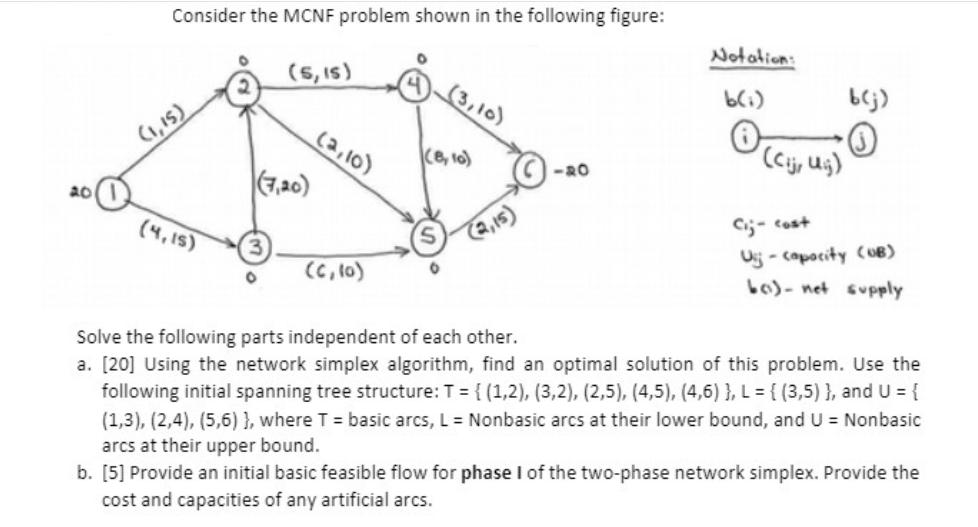Question
Consider the MCNF problem shown in the following figure: (1,15) 20 (4,15) (5,15) (7,20) (2,10) (C, 10) (3,10) (8,10) C-20 Solve the following parts

Consider the MCNF problem shown in the following figure: (1,15) 20 (4,15) (5,15) (7,20) (2,10) (C, 10) (3,10) (8,10) C-20 Solve the following parts independent of each other. Notation: b(i) bcj) (Cij, U) Cij- cost Uj-capacity (UB) ba)- net supply a. [20] Using the network simplex algorithm, find an optimal solution of this problem. Use the following initial spanning tree structure: T = {(1,2), (3,2), (2,5), (4,5), (4,6) }, L = {(3,5)}, and U = { (1,3), (2,4), (5,6)), where T = basic arcs, L = Nonbasic arcs at their lower bound, and U = Nonbasic arcs at their upper bound. b. [5] Provide an initial basic feasible flow for phase I of the two-phase network simplex. Provide the cost and capacities of any artificial arcs.
Step by Step Solution
There are 3 Steps involved in it
Step: 1

Get Instant Access to Expert-Tailored Solutions
See step-by-step solutions with expert insights and AI powered tools for academic success
Step: 2

Step: 3

Ace Your Homework with AI
Get the answers you need in no time with our AI-driven, step-by-step assistance
Get StartedRecommended Textbook for
A First Course in Differential Equations with Modeling Applications
Authors: Dennis G. Zill
11th edition
1305965728, 978-1305965720
Students also viewed these Computer Network questions
Question
Answered: 1 week ago
Question
Answered: 1 week ago
Question
Answered: 1 week ago
Question
Answered: 1 week ago
Question
Answered: 1 week ago
Question
Answered: 1 week ago
Question
Answered: 1 week ago
Question
Answered: 1 week ago
Question
Answered: 1 week ago
Question
Answered: 1 week ago
Question
Answered: 1 week ago
Question
Answered: 1 week ago
Question
Answered: 1 week ago
Question
Answered: 1 week ago
Question
Answered: 1 week ago
Question
Answered: 1 week ago
Question
Answered: 1 week ago
Question
Answered: 1 week ago
Question
Answered: 1 week ago
Question
Answered: 1 week ago
Question
Answered: 1 week ago
Question
Answered: 1 week ago
View Answer in SolutionInn App



